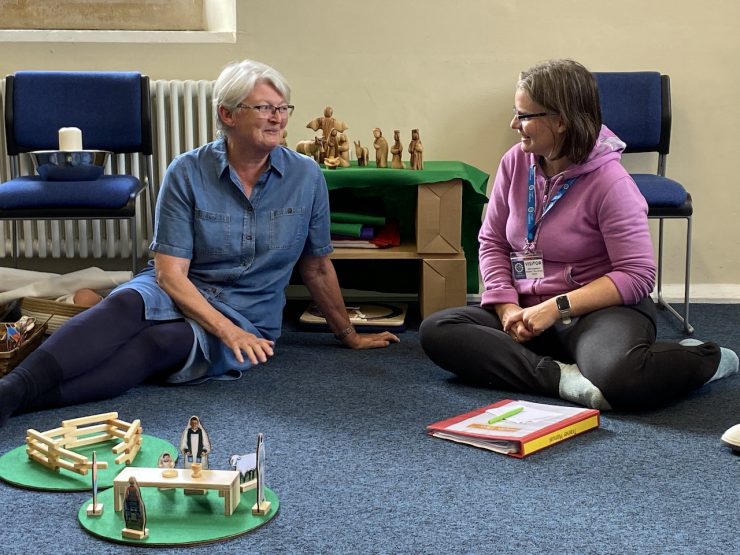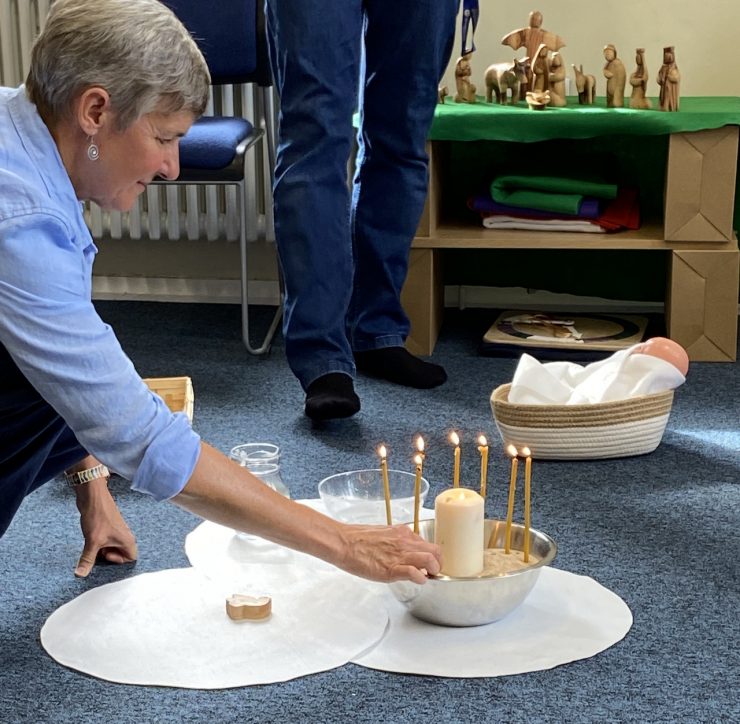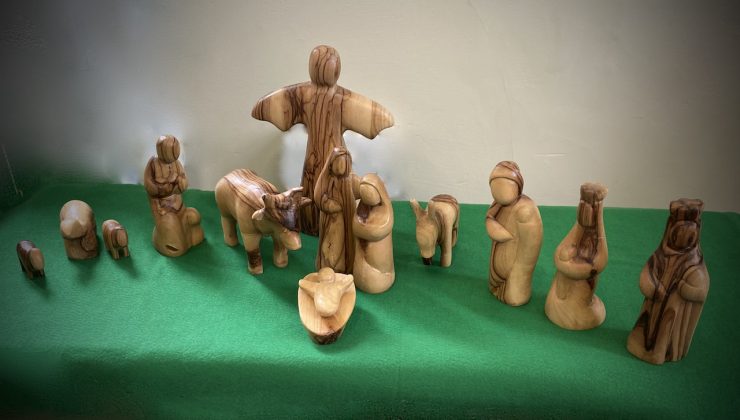What happens when grown-ups are let loose to Godly Play
 When 12 people from across Cornwall got together for three days to learn about Godly Play, they didn’t necessarily expect to have their own spirituality enriched. But they left feeling renewed with a greater sense of wonder from their immersion in this story-telling approach for children.
When 12 people from across Cornwall got together for three days to learn about Godly Play, they didn’t necessarily expect to have their own spirituality enriched. But they left feeling renewed with a greater sense of wonder from their immersion in this story-telling approach for children.
“It enables everyone participating to go deep into the story and ask profound questions… theologically it can be really challenging,” says Revd Becca Bell from Southeast Cornwall and one of the participants. On the face of it, it’s hard to imagine how a Biblical or liturgical story told in a way that appeals to children, mostly using sand, blocks, wooden people and felt, could have such an effect.
Joining in for their last day however, I could see why. The Godly Play training sessions, run by trainers Katherine Lyddon and Brenton Prigge, shared the techniques and history behind the programme. Through practicing on each other, the cohort experienced its effectiveness as they encouraged each other to explore and make space for their own spirituality. I sat in on two of these presentations and was touched by how, just by focusing on the story and even the physical elements that were used, I was drawn in. I found myself re-visiting questions that I had thought I had long since dealt with.
Godly Play recognises the spirituality that is innate in all of us
“Godly Play recognises that spirituality is innate in all of us, especially in children, but sadly it gets chipped away over time. Given the right conditions, lost pathways can be reconnected, and that spirituality can grow again and flourish,” says Katherine. The foundational theology is the spirituality of children. Godly Play begins with a basic assumption that children instinctively know God. As they say, children know what it is to play hide-and-seek with the elusive presence of God within themselves and the world. As they grow up, too often that playfulness gets supressed along with other ‘childish’ practices.
The programme is a very prescriptive, having been built up and tested over three decades. There are scripts and particular sets of models for each story or aspect of liturgy, but the wonder it leads to is completely free-range.
The sessions have the same pace: welcome, story, time for wonder and response through play, then a feast. The set-up is the same, a circle with the sections at children-friendly height all around, organised into four genres. Sacred Stories (from the Old and New Testaments); the Parables, Liturgy (including church festivals) and Silence (time to listen and contemplate). Each story within the genre is captured through beautifully crafted wooden toys and props.
The wonder of wondering
While the stories are told the children (young people/adults/older people) listen quietly, and then encouraged to wonder things like which part of the story they liked best, which part they think is most important and where they are in the story. With children, the ‘I wonders’ are a wonder on themselves.

Jane Wheeler trying out some Godly Play
“It’s great because there are no right or wrong answers, says Jane Wheeler, the visionary who organised the course, one of the participants and Schools and Families Lead from New Street, Falmouth. “It’s so unlike a school session when you are always looking for the right answer – there are none. Also, when the children do their ‘work’, which is the response time with craft materials, there is no expectation that what they are doing is good or bad, artistic or inspired, it is simply their own personal response to the story they have heard.”
“It’s so unlike a school session when you are always looking for the right answer – there are none.
This time for response always follows the story. Listeners can open and re-explore whatever story materials they want to play with or develop their feelings about what they’ve heard through modelling, painting, drawing, reading or just by being still.
Godly play and Messy Church
Sounds a bit like Messy Church? “They are very different,” says Katherine. “Fundamental to Godly Play is the chance to wonder, understand sacred space, the value of silence and the encouragement to freely express responses. Messy Church is Christ-centred, creative, celebratory with a strong hospitality element. Godly Play follows a traditional church format of gathering, exploring the word and sharing food and drink together. Both approaches are great, and both can be used at different times. One doesn’t cancel out the other.”
Pioneered in the US back in the 1990s, it was championed over here by Rebecca Nye, one of the founder members of Godly Play in the UK. Today it is a registered charity with trainers operating all over the UK.
The 12 strong cohort all felt very blessed to be there. Each of them came from churches, schools or nurseries where they felt the programme could be adapted to work in their setting. They also appreciated the opportunity to network with each other, “It’s given us a great support network and confidence to try things,” says Beth from St Luke’s, Boscoppa. “I’m really excited to use Godly Play in our church and the nursery where I work. It is perfect for very young children.”
“I’m really excited to use Godly Play in our church and the nursery where I work. It is perfect for very young children.”
Godly Play across the age range
Chrissie Aindow, from St Martins, Liskeard, is keen to use this in their burgeoning ministry in the local secondary school. “I’m hoping it will be a gentle way to introduce faith by working in small groups. It’s perfect for this age groups as there’s no judgement, no striving for a right answer because there isn’t one.”
So says Revd Becca. “I can see this working in so many ways across the age range. I’m really excited to use this in our churches, and I’m already thinking about Advent and definitely Lent.”
The course was made much more affordable by a grant from the Funds for Mission, the Diocesan Education Department and the TM team at Falmouth. Thanks to Jane Wheeler, who worked creatively with her team and Godly Play, the course finally got to run in Truro despite a few false starts because of the pandemic. “I just knew it would be good, but it’s been brilliant!”
Godly Play is like a walk with God
“For me, says Beth, “the three days has literally been a walk with God. The presence and power of God has been palpable, in the stories, sharing and exploring of Godly Play.”
It’s a great reminder that none of us will inherit the Kingdom of God unless we approach it with the eyes and hearts of children. Godly Play can help all of us remember what that means.

